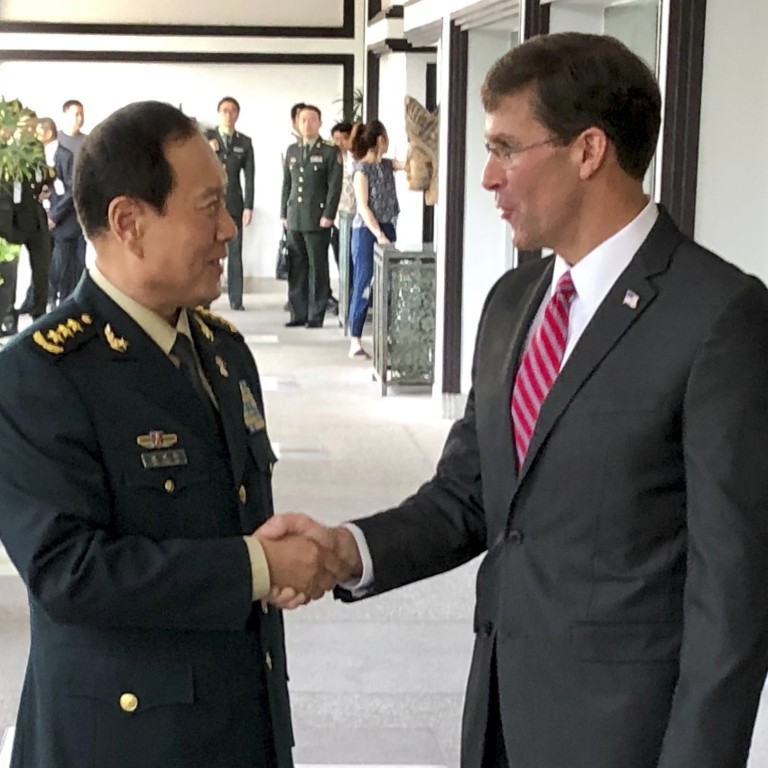
US should stop its provocation over Taiwan and South China Sea, Beijing defence minister tells Mark Esper
- Wei Fenghe calls on Washington to cease flexing its muscles, while Esper says his country seeks a free and open Indo-Pacific
- But the two defence ministers discuss how military-to-military cooperation can be a ‘stabiliser’ in the broader relationship
“Minister Wei … urged the US to stop flexing muscles in the South China Sea and to not provoke and escalate tensions,” Wu said.
It was the first meeting between the two defence ministers and came two weeks after their first telephone conversation.
Esper tweeted that he had discussed with Wei how the two nations could continue a relationship focused on “maintaining the international rule-based system” that had lasted for 70 years.
“The US seeks a free and open Indo-Pacific with respect for national sovereignty and peaceful dispute resolution,” Esper wrote.
Esper said on Sunday that Beijing was “increasingly resorting to coercion and intimidation to advance its strategic objectives, at the expense of other nations”.
The two countries’ militaries have regularly confronted each other in the South China Sea, including during US “freedom of navigation” operations near Chinese-controlled islands and reefs.
China claims almost all of the South China Sea, through which the world’s busiest trade waterways pass, and has built military outposts on artificial islands despite overlapping claims by Brunei, Malaysia, the Philippines, Taiwan and Vietnam.
In the meeting with Esper, Wei also told the US side to handle the issue of Taiwan carefully, and “not add new uncertainties to the [Taiwan] Strait”, Wu said.
But unlike his previous hardline remarks on bringing Taiwan into Beijing’s fold by force if necessary, Wei told Esper that Beijing was “devoted to a peaceful resolution of the Taiwan issue”, adding only that it would not tolerate any significant incidents that advanced Taiwan’s independence.
Beijing sees the self-ruled Taiwan as a breakaway province estranged since the end of the Chinese civil war in 1949, but the US has supported the island’s government even after switching official diplomatic recognition from Taipei to Beijing in 1979.
On Sunday, the People’s Liberation Army Navy sailed its new aircraft carrier, the Type 001A, through the Taiwan Strait to the South China Sea for what it called “tests and training”.
What’s China’s ‘nine-dash line’ and why has it created so much tension in the South China Sea?
Despite the China-US relationship turning into a strategic rivalry on most fronts, including trade, economics, technology and geopolitics, the two defence chiefs agreed they should maintain communication and healthy cooperation, for the sake of a peaceful and stable region and world.
Wei said military-to-military relations had an important part to play in the broader relationship and should be furthered as a “stabiliser”, according to Wu.
Between 1942 and 1944, the US fought against Japan in southern China alongside Chiang Kai-shek’s Nationalist army, who then fled to Taiwan in 1949 after losing the civil war to the Communists.

